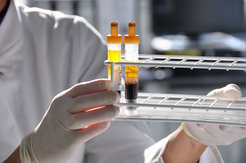Majority of depressive patients show altered stress reactivity
Important findings for future development of antidepressants
In search of biomarkers for depression, molecular changes with high informative value have been identified in the blood of patients. Only in reaction to stress, however, those characteristic changes in gene activities were verifiable. In over 80 per cent of the patients examined, an altered reactivity of the glucocorticoid receptor could be measured. Therefore, scientists of the Max Planck Institute stipulate that future drugs for treatment of depression should make use of the molecules involved.

Researchers around Florian Holsboer, Director of the Max Planck Institute of Psychiatry, have recently succeeded in identifying specific molecular changes in blood cells of depressive patients. This was even more surprising as depression is characterized by altered communication of neurons in the brain. This communication, however, is also influenced by stress hormones from the blood, such as cortisol. This hormone binds the glucocorticoid receptor (GR), thus controlling the activity of a wide variety of genes in order to provoke stress-related cellular adjustments.
Earlier blood tests had verified a disturbed regulation of the stress hormone cortisol in about 30 % of patients suffering from depression. The susceptibility of the glucocorticoid receptor to bind cortisol has changed. Therefore, the Max Planck scientists searched for a simple and more sensitive method for detection of GR-functionality. In the context of a study, the GR stress system of the participants was activated by drugs. The resulting gene activities in blood cells of depressive patients were compared to those of healthy controls. Thereby, 24 of 29 depressive patients showed a characteristic activity profile of their genes. Thus, it could be demonstrated for the first time, that over 80 per cent of the depressive patients have a modified GR-functionality. „To our astonishment, the majority of the patients suffering from depression show an altered molecular reaction in response to the activation of their glucocorticoid receptor. This confirms our long-lasting assumption that depression is first and foremost a stress disorder. Medical treatment should therefore deal with the causes, e.g., with the glucocorticoid receptor itself“, says Elisabeth Binder, Research Group Leader at the Max Planck Institute.
The Max Planck scientists hope that the current results will lead to the development of novel antidepressants, which will focus on influencing stress reactivity.
BM
